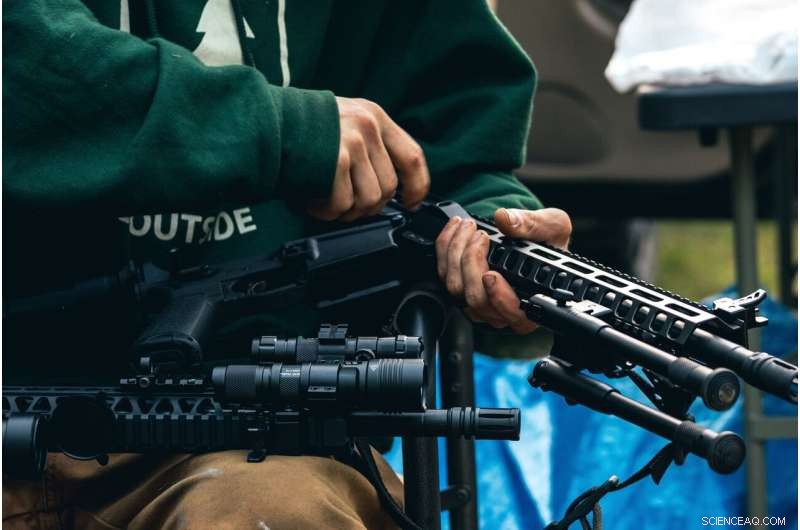Hvorfor våbenkontrollove ikke vedtager Kongressen på trods af flertallets offentlig støtte og gentagne forargelse over masseskyderier

Kredit:Unsplash/CC0 Public Domain
Med blodbadet i Uvalde, Texas og Buffalo, New York i maj 2022, er der igen begyndt opfordringer til Kongressen om at indføre våbenkontrol. Siden massakren i 2012 på 20 børn og fire ansatte på Sandy Hook Elementary School i Newtown, Connecticut, har lovgivning, der er indført som svar på massedrab, konsekvent ikke kunnet bestå Senatet. Vi bad politologerne Monika McDermott og David Jones om at hjælpe læserne med at forstå, hvorfor yderligere restriktioner aldrig passerer, på trods af at et flertal af amerikanerne støtter strammere våbenkontrollove.
Massedrab bliver hyppigere. Alligevel er der ikke vedtaget nogen væsentlig våbenlovgivning som reaktion på disse og andre masseskyderier. Hvorfor?
Monika McDermott:Selvom der konsekvent er et flertal for at begrænse adgangen til våben lidt mere, end regeringen gør i øjeblikket, er det normalt et slankt flertal – selvom den støtte har en tendens til at stige på kort sigt efter begivenheder som de seneste masseskyderier.
Vi har en tendens til at finde ud af, at selv våbenejere støtter restriktioner som baggrundstjek for alt våbensalg, inklusive ved våbenshows. Så det er en, som alle står bag. Den anden, som våbenejende husholdninger står bag, er, at de ikke har noget imod, at retshåndhævelse tager våben væk fra folk, der er blevet lovligt vurderet til at være ustabile eller farlige. Det er to begrænsninger, som du kan få virtuel enstemmig støtte fra den amerikanske offentlighed. Men enighed om specifikke elementer er ikke alt.
Dette er ikke noget, folk råber efter, og der er så mange andre ting i blandingen, som folk er meget mere bekymrede over lige nu, som økonomien. Også folk er usikre på det føderale budgetunderskud, og sundhedspleje er stadig et evigt problem i dette land. Så den slags ting topper våbenkontrollovgivningen med hensyn til prioriteringer for offentligheden.
Så man kan ikke bare tænke på flertalsopbakning til lovgivning; du skal tænke over prioriteringer. Folk på kontoret bekymrer sig om, hvad prioriteringerne er. Hvis nogen ikke vil stemme dem ud på grund af et problem, så vil de ikke gøre det.
Det andet spørgsmål er, at du netop har et anderledes syn på våbensituationen i våbenbesiddende husstande og ikke-våbenejende husholdninger. Næsten halvdelen af befolkningen bor i en husstand med en pistol. Og disse mennesker har en tendens til at være betydeligt mindre bekymrede end dem i ikke-våbenhusstande for, at et masseskyderi kunne ske i deres lokalsamfund. Det er også usandsynligt, at de vil sige, at strengere våbenlove ville reducere faren for masseskyderier.
De mennesker, der ikke ejer våben, tænker det modsatte. De tror, at våben er farligt. They think if we restricted access, then mass shootings would be reduced. So you've got this bifurcation in the American public. And that also contributes to why Congress can't or hasn't done anything about gun control.
How does public opinion relate to what Congress does or doesn't do?
David Jones:People would, ideally, like to think that members of Congress are responding to public opinion. I think that is their main consideration when they're making decisions about how to prioritize issues and how to vote on issues.
But we also have to consider:What is the meaning of a member's "constituency"? We can talk about their geographic constituency—everyone living in their district, if they're a House member, or in their state, if they're a senator. But we could also talk about their electoral constituency, and that is all of the people who contributed the votes that put them into office.
And so if a congressmember's motive is reelection, they want to hold on to the votes of that electoral constituency. It may be more important to them than representing everyone in their district equally.
In 2020, the most recent congressional election, among citizens who voted for a Republican House member, only 24% of those voters wanted to make it more difficult to buy a gun.
So if you're looking at the opinions of your voters versus those of your entire geographic constituency, it's your voters that matter most to you. And a party primary constituency may be even narrower and even less in favor of gun control. A member may have to run in a party primary first before they even get to the general election. Now what would be the most generous support for gun control right now in the U.S.? A bit above 60% of Americans. But not every member of Congress has that high a proportion of support for gun control in their district. Local lawmakers are not necessarily focused on national polling numbers.
You could probably get a majority now in the Senate of 50 Democrats plus, say, Susan Collins and some other Republican or two to support some form of gun control. But it wouldn't pass the Senate. Why isn't a majority enough to pass? The Senate filibuster—a tradition allowing a small group of Senators to hold up a final vote on a bill unless a three-fifths majority of Senators vote to stop them.
Monika McDermott:This is a very hot political topic these days. But people have to remember, that's the way our system was designed.
David Jones:Protecting rights against the overbearing will of the majority is built into our constitutional system.
Do legislators also worry that sticking their neck out to vote for gun legislation might be for nothing if the Supreme Court is likely to strike down the law?
David Jones:The last time gun control passed in Congress was the 1994 assault weapons ban. Many of the legislators who voted for that bill ended up losing their seats in the election that year. Some Republicans who voted for it are on record saying that they were receiving threats of violence. So it's not trivial, when considering legislation, to be weighing, "Yeah, we can pass this, but was it worth it to me if it gets overturned by the Supreme Court?"
Going back to the 1994 assault weapons ban:How did that manage to pass and how did it avoid a filibuster?
David Jones:It got rolled into a larger omnibus bill that was an anti-crime bill. And that managed to garner the support of some Republicans. There are creative ways of rolling together things that one party likes with things that the other party likes. Is that still possible? I'm not sure.
It sounds like what you are saying is that lawmakers are not necessarily driven by higher principle or a sense of humanitarianism, but rather cold, hard numbers and the idea of maintaining or getting power.
Monika McDermott:There are obvious trade-offs there. You can have high principles, but if your high principles serve only to make you a one-term officeholder, what good are you doing for the people who believe in those principles? At some point, you have to have a reality check that says if I can't get reelected, then I can't do anything to promote the things I really care about. You have to find a balance.
Wouldn't that matter more to someone in the House, with a two-year horizon, than to someone in the Senate, with a six-year term?
David Jones:Absolutely. If you're five years out from an election and people are mad at you now, some other issue will come up and you might be able to calm the tempers. But if you're two years out, that reelection is definitely more of a pressing concern.
Some people are blaming the National Rifle Association for these killings. What do you see as the organization's role in blocking gun restrictions by Congress?
Monika McDermott:From the public's side, one of the important things the NRA does is speak directly to voters. The NRA publishes for their members ratings of congressional officeholders based on how much they do or do not support policies the NRA favors. These kinds of things can be used by voters as easy information shortcuts that help them navigate where a candidate stands on the issue when it's time to vote. This gives them some credibility when they talk to lawmakers.
David Jones:The NRA as a lobby is an explanation that's out there. But I'd caution that it's a little too simplistic to say interest groups control everything in our society. I think it's an intermingling of the factors that we've been talking about, plus interest groups.
So why does the NRA have power? I would argue:Much of their power is going to the member of Congress and showing them a chart and saying, "Look at the voters in your district. Most of them own guns. Most of them don't want you to do this." It's not that their donations or their threatening looks or phone calls are doing it, it's the fact that they have the membership and they can do this research and show the legislator what electoral danger they'll be in if they cast this vote, because of the opinions of that legislator's core constituents.
Interest groups can help to pump up enthusiasm and make their issue the most important one among members of their group. They're not necessarily changing overall public support for an issue, but they're making their most persuasive case to a legislator, given the opinions of crucial voters that live in a district, and that can sometimes tip an already delicate balance.
 Varme artikler
Varme artikler
-
 Muldyr, værktøj og gamle mursten:Genopbygning af Kinas murNatur, tid, omsorgssvigt og millioner af fodtrin har taget deres vejafgift på Den Kinesiske Mur og efterladt meget af den smuldrende, men at reparere det kan være omhyggeligt – og kontroversielt – arb
Muldyr, værktøj og gamle mursten:Genopbygning af Kinas murNatur, tid, omsorgssvigt og millioner af fodtrin har taget deres vejafgift på Den Kinesiske Mur og efterladt meget af den smuldrende, men at reparere det kan være omhyggeligt – og kontroversielt – arb -
 Forudsigelse af forsætlig regnskabsmæssig fejlrapporteringKredit:Alvin Lee I U.S. Securities and Exchange Commission (SEC) 10-K årsrapport for dets regnskabsår, der slutter 31. juli, 2008, Den amerikanske smykkeforhandler Zale Corporation (»Zales«) nævnt
Forudsigelse af forsætlig regnskabsmæssig fejlrapporteringKredit:Alvin Lee I U.S. Securities and Exchange Commission (SEC) 10-K årsrapport for dets regnskabsår, der slutter 31. juli, 2008, Den amerikanske smykkeforhandler Zale Corporation (»Zales«) nævnt -
 Hvordan racemæssig skævhed kan begrænse internetadgang for farvede menneskerKredit:CC0 Public Domain Kaffebarer og afslappede restauranter er en vigtig del af det amerikanske liv. Selv ud over den mad og drikkevarer, de sælger, de tilbyder os et sted at bruge toilettet el
Hvordan racemæssig skævhed kan begrænse internetadgang for farvede menneskerKredit:CC0 Public Domain Kaffebarer og afslappede restauranter er en vigtig del af det amerikanske liv. Selv ud over den mad og drikkevarer, de sælger, de tilbyder os et sted at bruge toilettet el -
 Falske nyheder kan give bagslag for virksomheder, der er taget på fersk gerningKredit:CC0 Public Domain I en tid med falske nyheder, mindre omhyggelige virksomheder bruger vildledende taktikker til at udtvære deres rivaler. Men virksomheder, der spreder falske nyheder mod de
Falske nyheder kan give bagslag for virksomheder, der er taget på fersk gerningKredit:CC0 Public Domain I en tid med falske nyheder, mindre omhyggelige virksomheder bruger vildledende taktikker til at udtvære deres rivaler. Men virksomheder, der spreder falske nyheder mod de
- Astronomer undersøger et mystisk isoleret stjernehobkompleks
- Sådan forhindrer du Avalanches
- Anti-hacker-teamet udvikler datadelingsskema til skylagring
- Forskere afslører in situ manipulation af aktivt guld-titandioxid-interface
- Autoklavpipette Tips
- Supercomputer analyserer webtrafik på tværs af hele internettet


